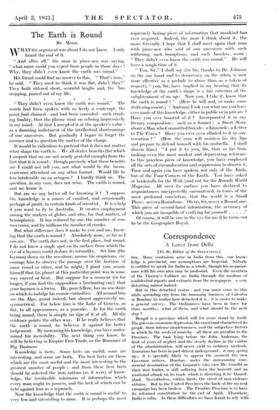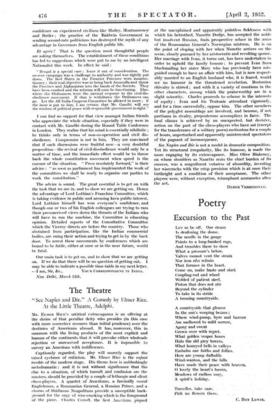Correspondence
A Letter from Delhi
[To the Editor of the SPECTATOR.] Sm,—Many confusions arise in India from this---our know. ledge is provincial, our assumptions arc Imperial. Nobody is entitled to speak for India as it whole, though his acquaint- ance with h his own area may he profound. Even the members of the Viceroy's Cabinet see India through the med• of confidential reports and extracts from the newspapers -a very distorting mirror indeed.
But in this detached centre --and you must conic to this white spreading city from the humming business of Calcutta or Bombay to realize how detached it is—it is easier to make a general survey. The Ordinances have been in force for
three months ; what of them. and what al hi be the next step
Bengal is a province which will for years stand by itself. The grievous economic depression. the emotional character of its people, their intense suspiciousness, and the subjective factors in which lie the seeds of anarchy—all these are peculiar to the Province. The task lying before Sir John Anderson, the fruit. of years of neglect and the steady decline in the calibre of the administration, will never yield to ordinary methods. Terrorism has been in part driven underground ; it may spring up ; it is specially likely to appear the r llllll lent the new Governor arrives. Bombay. under the unreasoning com- mercial domination of the Gujarati,: who own Mr. Gandhi as their first leader, is still suffering from the boycott and an irrational attack on its trade which is diverting it to Ahmed- abad. Nevertheless, within limits the creed of non-violence obtains. But in the United Provinces the back of the no-rent campaign has been broken. The Frontier Province is to have its reformed constitution by the end of April. Elsewhere, India is calm. In these difficulties we have learnt to rely with
confidence on experienced civilians like Hailey, Montmorency and Butler ; the practice of the Baldwin Government in sending second-rate politicians has destroyed the myth of any advantage in Governors from English public life.
El apris? That is the question most thoughtful people are asking themselves. The establishment of these conditions has led to suggestions which were put to me by an intelligent Nationalist this week. In effect he said :
" Bengal is a special ease ; leave it out of consideration. The no-rent campaign was a challenge to authority and was rightly put down. The Red Shirts in the Frontier Province were-insurrec- tionary ; their real objective was to bring back Amanulla and throw the Province and Afghanistan into the hands of the Soviets. They have been crushed and the reforms will soon bo functioning. Else. where the Ordinances. were the natural response to the civil dis- obedience movement. If that is withdrawn the Ordinances can go. Let the All India Congress Committee bo allowed to meet ; if the issue is put to him, I am certain that Mr. Gandhi will see the wisdom of political peace with responsible government insight."
I can find no support for that view amongst Indian friends who appreciate the whole situation, especially if they were in contact with Mr. Gandhi during the Round Table Conference in London. They realize that his mind is essentially nihilistic ; he thinks only in terms of non-co-operation and civil dis- obedience. Compromise is not in him. They are convinced that if such discussions were fruitful now—a very doubtful proposition—the revival of civil disobedience would only be a matter of time, and the immediate effect would be to throw hack the whole constitution movement when speed is the essence of the situation. " Press resolutely forward," is their advice ; as soon as parliament has implemented the work of the committees we shall be ready to organize our parties to work the constitution."
The advice is sound. The great essential is to get on with the task that we are in, and to show we are getting on. Hence the advantage of Lord Lothian's Franchise Committee, which is taking evidence in public and arousing keen public interest. Lord Lothian himself has won everyone's confidence, and though one or two of his English colleagues are trying to ram their preconceived views down the throats of the Indians who will have to run the machine, the Committee is educating opinion. Detailed reports of the Consultative Committee which the Viceroy directs are before the country. Those who abstained from participation, like the Indian commercial bodies, arc ruing their action and trying to get in by the back door. To arrest these movements by conferences which are bound to be futile, either at once or in the near future, would
be fatal.
Our main task is to get on, and to show that we are getting OR. If we do that there will be no question of getting out. I may be able to indicate a possible time-table in my next letter.
New Delhi, March 12th.
—I am, Sir, &c., YOUR CORRESPONDEN"r IN INDIA.

































 Previous page
Previous page